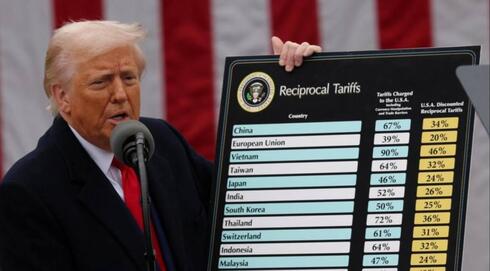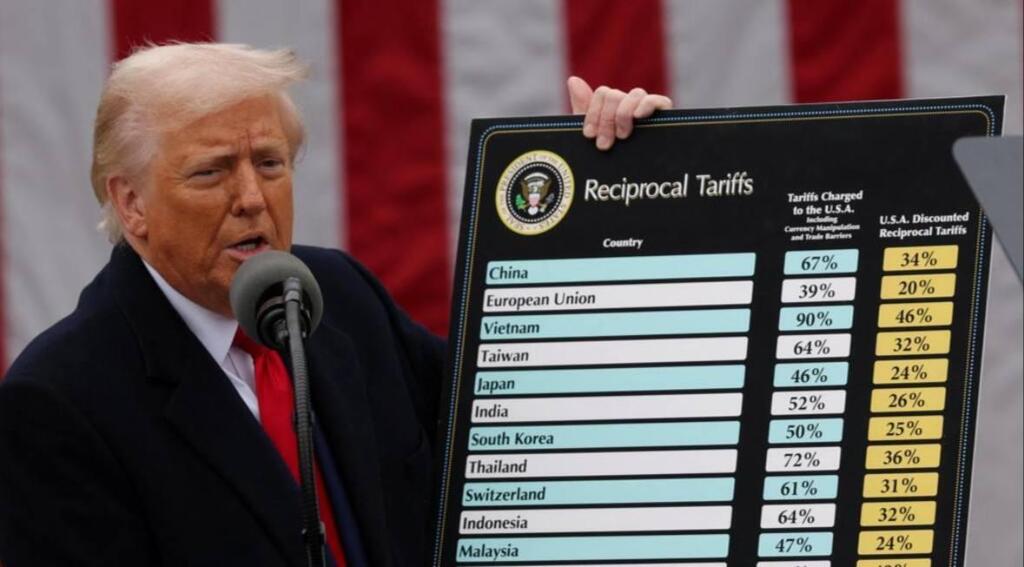
Israel grapples with US tariff shock as economy braces for next steps
As officials and industry leaders scramble to assess the damage, Israel weighs diplomatic and economic responses to mitigate the impact.
A wave of concern has swept through Israel's economic circles following the decision by the U.S. President to impose a 17% tariff on imports from the country. Emergency discussions convened in the Finance and Economy Ministries in Jerusalem, while industry leaders voiced strong warnings about potential damage to investments and competitiveness. The unexpected move has prompted a flurry of activity as officials and business figures scramble to understand the implications and formulate a response.
The sheer scale of Israeli exports to the United States underscores the significance of this decision. In 2024, the total value of these exports reached $37.2 billion, according to data from the Foreign Trade Administration at the Ministry of Economy and Industry. Of this amount, $14.3 billion comprised goods, while $22.9 billion was in services. Notably, services are not subject to the new tariffs at this stage. According to the Export Institute, the primary goods exported from Israel to the U.S. last year were semiconductors and electronic equipment (27% of exports) and optical and medical equipment and pharmaceuticals (24%).
The decision has triggered immediate alarm within the Israeli government. The Ministry of Finance announced that Finance Minister Bezalel Smotrich would convene the ministry's leadership for an urgent discussion on the ramifications of the decision and to examine necessary next steps. The prevailing sentiment is one of surprise and apprehension. As one senior industry figure noted, "It is not yet clear whether Trump himself understands the implications."
The Manufacturers Association has been particularly vocal in its criticism. Its president, Ron Tomer, stated that "Superficially, an assertion that Israel imposes tariffs on American goods at a rate of 33% (the tariff rate Trump claimed Israel imposes on the U.S.) is incomprehensible, and therefore the step of 17% tariffs is unclear." Tomer further warned that "This move could harm Israel's economic stability, deter foreign investments in it, and weaken the competitiveness of Israeli companies in the American market." He expressed hope for a swift reversal, stating, "Should this remain the case, this decision will represent a setback in trade and investment relations between the countries, especially in light of the long-standing relationship with deep and loyal friendship between the two countries. We hope and believe that the decision will be short-lived, and we will work with the Finance and Economy Ministries and the government to cancel it."
Despite widespread concern, some perspectives suggest the impact on Israel might be relatively less severe compared to other nations. Amir Argaman, head of global markets strategy at Clal Insurance, posited that "Israel came out with relatively low damage compared to other countries," explaining that "a large part of Israel's exports should not be affected by the tariffs, at least not directly." He believes the U.S. aims to bring manufacturing back home or improve import conditions for American goods, potentially benefiting the U.S. economy in the long run.
However, the immediate reaction in the Israeli stock market painted a different picture, with Delta Galil's share price plummeting by over 9% following the announcement. While half of Delta Galil's sales are in Europe and Israel, the other half are in the U.S. The company's American operations, which involve marketing for major U.S. clients like Walmart and Nike, with production in Egypt, Vietnam, and China, are directly exposed to the new tariffs. While there's an expectation that these major clients will likely not abandon Delta Galil due to the widespread nature of textile manufacturing in the Far East and existing tariffs, the added cost burden remains a significant concern. Notably, tariffs of 10% were announced on Egypt, and a substantial 46% on Vietnam.
A key point of discussion revolves around the scope of the tariffs. Karin Mayer Rubinstein, CEO and Chairperson of the Israel Advanced Technology Industries (IATI), highlighted the potential difference in impact depending on whether the tariffs apply solely to physical goods or extend to software products, particularly Software as a Service (SaaS), which is the primary area of activity for many Israeli high-tech companies. She noted that "If the tariffs apply only to physical products – such as electronic components, machinery, or food – the direct impact on the high-tech sector will be limited." However, she cautioned that "if the tariffs also apply to software products, and in particular to software services in a Software as a Service (SaaS) model – the main area of activity of many Israeli high-tech companies – this is a move that could fundamentally change the way Israeli companies access the American market and could even deter potential investors and customers." She also raised the crucial question of whether exports of chips, a strategic sector with significant global activity for Israeli companies, will be included.
The Export Institute has indicated that the impact of the tariffs on Israeli goods exports is being examined and that exemptions may be possible for some essential export sectors, including pharmaceuticals and semiconductors. They stated that "the exemption of the pharmaceutical and semiconductor industries, alongside the stability in the trade of business services, on which no tariffs will be imposed, provides a stable basis for the continuation of economic cooperation between the countries." Nevertheless, the institute acknowledged that "the new tariff policy presents Israel with a significant challenge, especially for industries not exempt from the tariffs," and that "Israel will need to focus diplomatic and economic efforts to minimize the damage and find new opportunities in other markets."
Echoing this sentiment, Shmuel Abramzon, the Chief Economist at the Ministry of Finance, acknowledged that "First of all, this is a difficult event for the global economy, and if the global economy weakens, it will affect Israel." However, he offered a slightly more optimistic perspective by pointing out that "the reform, at least as far as we understand it, does not affect services, which are over 50% of exports, so high-tech will be less affected." He also raised the question of Israel's relative standing, stating, "It's not a pretty event, but Israel's attractiveness is measured relative to other countries. So the question is also what is the significance for a company operating in Europe that will pay a tariff of 20% compared to a company operating in Israel that will pay a tariff of 17%, and also what is the significance of a company moving to the U.S. and getting hit with tariffs from Europe." Abramzon expressed confidence in diplomatic channels, saying, "Overall, we have a good channel with the American administration, and I believe that through dialogue and negotiation, we will succeed in mitigating some of the severity of the decree."















